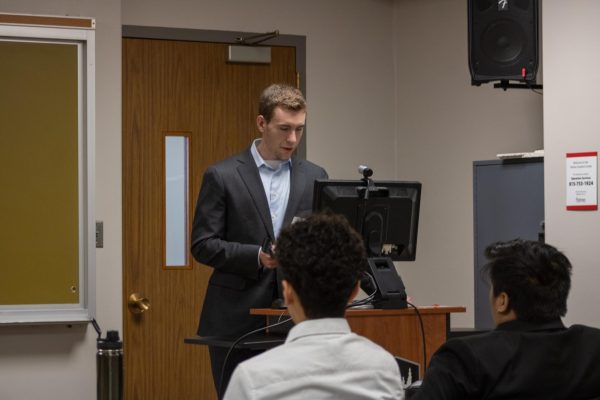Cancer survivor overcomes obstacles to live life
February 17, 2009
Andrew Lewis used to get nose bleeds.
In August of 1999, the then 13-year-old was at the Elroy-Sparta State Trail in southwestern Wisconsin, biking with his Boy Scout troop. Blood dripped from his nose during the course of the eight-hour, 13-mile trip, but this didn’t seem out of the ordinary; it was a regular occurrence in the Oswego resident’s life. Not having tissue handy, he wiped his nose with his glove.
“At the end of the day, I took off my glove. It was covered with blood,” Lewis said.
This turned out to be the first in a string of events that led to the then seventh-grader being diagnosed with high-risk lymphoblastic leukemia.
Like Stephanie Flood, who was profiled in the Feb. 11 Northern Star, Lewis, a senior electrical engineering major, wants to tell his story as a way to get the word out about April’s Relay for Life at NIU, for which he is the survivorship chair.
“As a cancer survivor, I wouldn’t want anyone else to go through what I went through,” said the slender, mustachioed 22-year-old.
While Lewis might be soft-spoken and look unassuming, he’s all heart and toughness inside. A list of his current and former ailments proves it:
He’s had kidney failure. One time, his neck swelled to the width of his head, and the lymph nodes under his arm pits swelled to the size of grapefruits. The lining of his mouth once fell out, leaving him unable to eat solid foods for weeks. He recently found out he has a heart condition. Chunks of his life are gone, as he’s blacked out for weeks at a time; other moments are blurred by short-term memory loss, a side effect of radiation treatments. He has Raynaud’s syndrome, a hereditary condition, which was brought on quicker by chemotherapy; it requires him to wear insulated work boots and biker gloves so his hands and feet don’t freeze. He’s arthritic, a result of one of the many medications he takes.
He’s had blood transfusions and spinal taps. He’s on a diet that restricts his eating of nuts, chocolate and organ meats. “The biggest thing that I miss is peanut butter. I love peanut butter,” he said.
His cancer is in remission, and through it all, Lewis has never felt bad for himself. He takes his health problems in stride; much like he did when he first found out he had leukemia.
“My parents said I was like, ‘What do I have to do to treat it? What do we have to do to find the solution,” he said. “I used the analytical engineering side of me.”
He hopes that mind-set will get him far in life: He’s interested in one day developing technologies for hybrid cars.
As for the advice he’d give to others going through a similar situation, he delivers it with the same, evenhanded practicality that’s kept him grounded through everything.
“You have to stick with it, not give up,” Lewis said. “I know part of it’s your frame of mind. … Having a positive outlook definitely helps. … And not giving up – that’s the biggest thing, no matter what, not giving up.”












